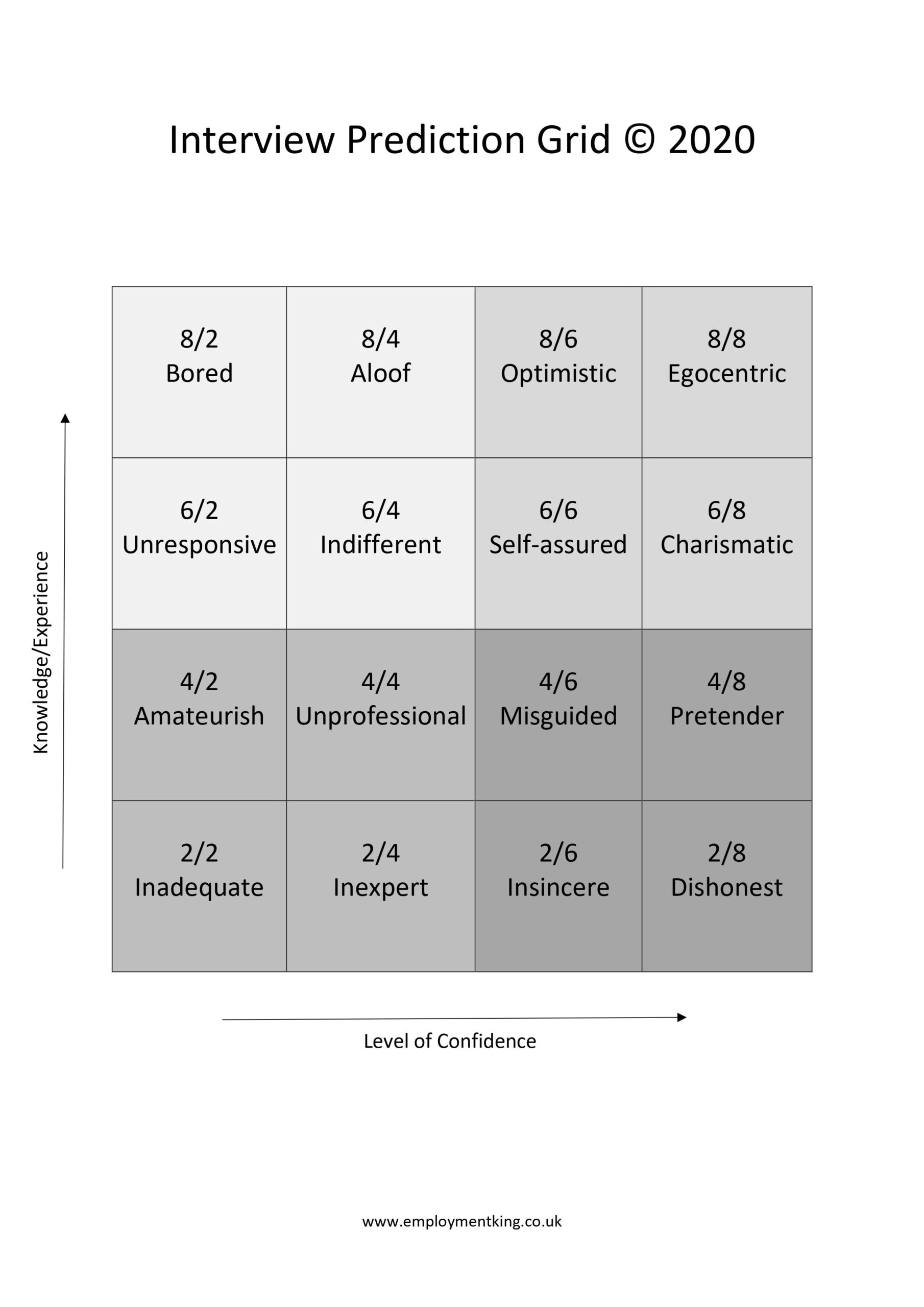Congratulations on completing the Interview Prediction Grid Test (IPG) ©2020.
Below is a breakdown of your Interview Identity
8/2 – Bored

Interviewers can sense when an applicant has high levels of knowledge/experience (in this case the highest level of K/E within the high/low segment) as sector terminology, industry references, and specific details stated by the applicant give unconscious clues to the interview panel. But the low level of confidence for 8/2 – Bored interviewees can come across as they aren’t interested in the position, even though they are.
This perceived lack of interest kills the likability factor which will influence the job interview outcome. It is often the monotone voice, with an unchanging pitch, and/or the short snappy answers which shapes this negative illusion. It is rare for employers to recruit such an employee for a medium level position, as they believe that anyone who is bored in a job interview will surely be bored once employed.
Many employers will recognise that the interviewee is anxious and will support the applicant throughout the interview, requesting more details and/or examples. If the nervous applicants fail to state the required criteria for the job role, the interviewer has little choice but to mark them low on the interview scorecard.
Strengths
Career professionals with an ‘8’ level of knowledge and experience are highly employable, as they possess a skill set that far surpasses that of what is required on most job adverts.
Often qualified to at least a master’s level and/or having over 10 years’ industry-related experience, their knowledge base far exceeds other applicants. In fact, their industry insights can be at a level where they can build on proven sector models and theories, adding to the field.
Such applicants’ temperaments will often suit their chosen career path: a creative mind for innovative industries or analytical brain for mathematical roles. This mixture of personality, knowledge and experience creates a most suitable, and often passionate, career professional who can deal with unforeseen sector-related problems with ease.
At their best ‘8’ knowledge/experience employees can redesign systems and processes and/or think of innovative ways to improve results never before thought of by colleagues working in the same industry. They also possess the insight to take ideas and technology from other sectors and make it relevant to their own.
Development
Having a wealth of related knowledge isn’t always enough to secure job offers, even when their reputation has created a pre-interview halo effect. What is also required is the third rule of a successful interview – communicate with confidence.
Positive slippage (i.e. the use of industry acronyms, referencing industry theories) creates a positive generalisation, “They must be an authority on the subject.” The long duration working within the sector should showcase competencies. Employers, seeing the potential value of an applicant, become interested, which is a short step away from desire. However, a weak communication style discourages intrigue.
Intrigue and excitement are created through the use of stories, vocal variety and through non-verbal communication. It is the poor communication style, even when an employer is aware of the applicant’s high level of knowledge/experience, that leads to the perception of the applicant as being bored.
Hesitations, excessive filler words and short snappy sentences, as well as a lack of assertiveness, decrease likeability. Even when questions are asked, that are directly relevant to the applicant’s knowledge/experience, a lack of self-belief in one’s own abilities results in an overuse of negative self-disclosure, reducing the perceived level of suitability.
A cold interviewer has a powerful negative effect on an 8/2 – Bored interviewee. Applicants believe the cold behaviour of the interviewer is down to their lack of skill and confidence (imposter syndrome), increasing their anxiety. To overcome this barrier, candidates need to externalise the interviewer’s behaviour, putting it down to their communication style and character rather than believing the interviewer’s actions are a result of the applicant’s own performance.

Advice for the job interview
- Acknowledge that you are likely to be the most knowledgeable person in the room on your chosen expertise. This self-awareness of ability increases confidence
- When answering technical questions, state the potential negative outcome to the problem you are discussing, and the steps you took to achieve the desired solution required to solve the issue. The ‘problem-action-outcome’ structure increases the length of the interview answer, improving the number of criteria the employer can score you on
- Change tonality, volume, and speed to keep the employer engaged and listening. The more interviewers register, the more likely they are to give a higher score
Research: IPG






